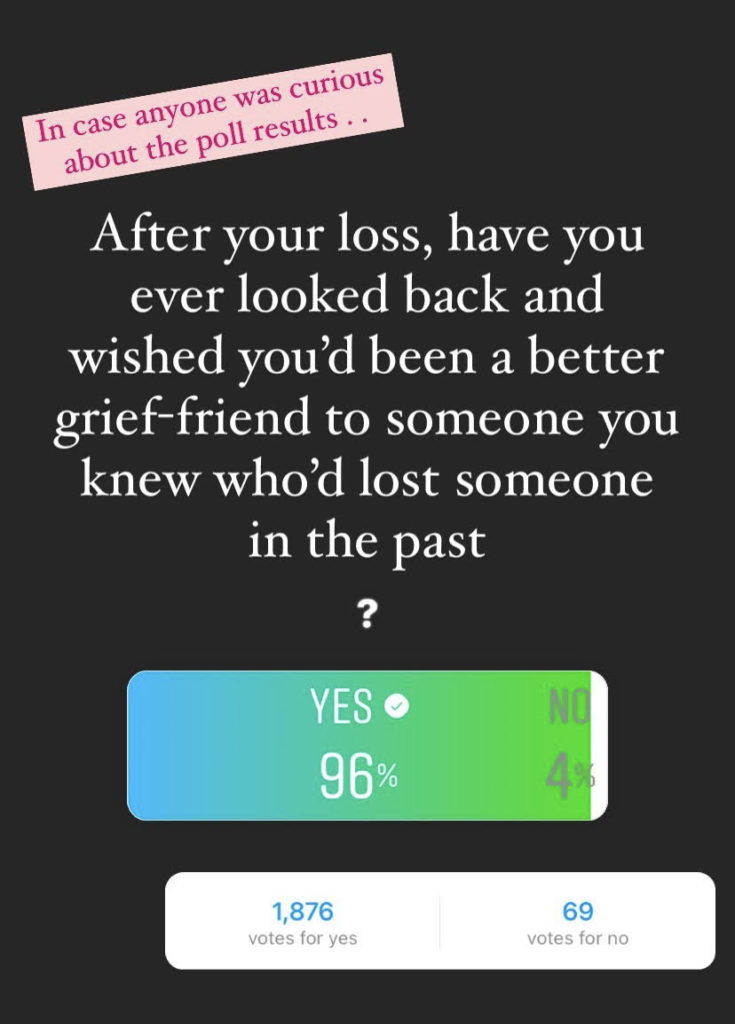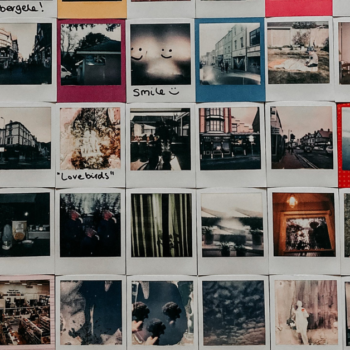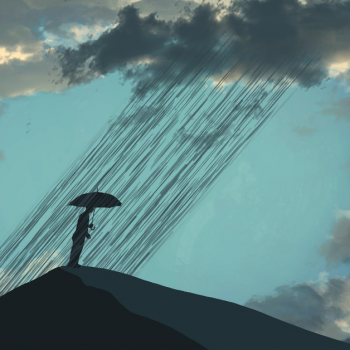64 Grief Support Regrets: You Don't Know 'til You Know
/ Coping with Grief : Litsa
For further articles on these topics:
Recently, going through some boxes that had moved with me, unopened, over several moves, I found a stack of cards. It was every sympathy card that I received after my father's death. I was only 18 when my dad died, so many of these cards were from other teenagers - friends, struggling for words. There is a lot I could say about these cards - things I am sure I will write about another day. But there was one that stood out. It was not a card sent in the weeks or months following my dad's death. It was a card sent over a year later.
Just about one year after my father died, my dear friend's father died. This card I found was from her, sent just a couple of months after her father's death. The card was an apology - a note saying that she wished she'd done more for me after my father died, but that she simply hadn't understood. It was not until her own father died that she knew. And with that knowledge came regret - regret for not saying more or doing more for me.
The moment I read the card, which I had forgotten entirely, all my own grief support regrets came flooding in. Before my father's death, I once learned that a friend's brother had died. The death had happened months before and, rather than immediately calling him, I hesitated, thinking it would just be an unwanted reminder. As though he'd somehow forgotten! (palm to head). And I wish I could say that was the only grief support misstep I ever made . . .
Luckily I know I'm Not Alone . . .
I shared this card and my cringe-worthy grief support memories on Instagram, wondering if others could relate. Within minutes responses poured in. In grief, we've all had people say the wrong things or do the wrong thing (or fail to say do anything at all!). But the reality is that many of us haven't just been on the receiving end of that - before our losses, we've been the ones making the missteps.
I was curious just how many people might be with me, so I did a quick Instagram poll. We had 1,945 people respond to this poll. 1,876 of these people (that's 96%) said that, after their loss, they wished they had been a better support to someone else grieving in the past.

On the one hand, these grief support regrets can leave us squirming with shame and writing cards of apology. On the other, it can also allow us a deeper understanding and empathy for those who say or do things that aren't helpful to me in my grief. After a loss, it is hard to remember what it was like not to know or understand the bottomless pit of grief. Recalling these "before" moments, when my own understanding of grief was limited and abstract and misguided, gives me a much deeper empathy for others. It reminds me that with grief, you often don't know until you know. You often can't know until you know. People are often doing their best and screwing it. We were once doing our bests and screwing it up.
Incredibly Common Grief Support Regrets (from those Grieving)
We received literally hundreds of grief regrets in just the 24 hour window that people could submit them. Though each was unique, there were some common themes and submissions that stood out. Below are 64 of the most common grief support regrets that people had as they looked back on their own grief.
- I should have checked in more regularly and months later. It doesn't get better in a couple of weeks or months.
- Never mentioning their loved one out of concern that it would 'upset' or 'remind' them.
- Believing that saying nothing was better than saying the wrong thing.
- Thinking that grief was only a reaction to death, so not realizing my friends were grieving when they went through a divorce, lost friends, lost a job, etc.
- Sending mass cards instead of sympathy cards with a personal message.
- Only reaching out on social media instead of sending a physical card.
- I didn't send a card or a gift because I felt like we weren't close enough and they might find it strange that I sent something.
- Thinking (and saying) that time will heal.
- Telling them I understood when I had no idea.
- Though it was well intentioned, I was overly intrusive. I insisted on staying at the persons house and later coming by every day. It was too much, but I thought I knew best.
- I thought that there is a timeframe to grief and that because they outwardly seemed better that meant they were no longer grieving.
- Not attending a funeral because we weren't that close. Now I know how much it means when people attend.
- Distancing myself and not checking in or inviting them to things because I assumed they needed space. I should have asked what they needed.
- Showing up when I wasn't wanted or needed because I wanted to feel useful.
- Avoiding a friend because I was so uncomfortable and didn't know what to say.
- Being didactic simply because I had experienced grief before.
- I assumed what would be helpful for me was going to help them in their grief.
- Calling someone "strong" and praising them for being "strong". Now I know that creates a pressure and makes people feel like they can't show their pain.
- I regret the judgement I subconsiously had when people were still posting about their loved one months or years later. I didn't understand that grief is so ongoing.
- Using platitudes like "at least they're no longer suffering or anything I said with "at least"
- Not remebering the death anniversary date or other important dates.
- I should have visited my friend who was dying of cancer (and her family). I thought they would only want their closest friends and family there and I would be intruding.
- Not thinking to check in at the holidays.
- We didn't invite someone to a party, assuming they wouldn't want to come. We should have just asked.
- I wish I'd reached out on National Siblings Day to friends who lost siblings.
- Not reaching out on hard days - I wish I'd reached out on Mothers Day and Fathers Day to friends who had lost a parent.
- I used toxic positivity, encouraging people to look for the silver lining and stay positive, rather than just letting them be with their feelings.
- I asked a friend who had a miscarriage why she hadn't started trying again.
- My partner and I didn't realize infertility caused grief until we went through it. We had not been supportive to friends in the past.
- Trying to connect with someone by talking about my grief instead of listening to them.
- I shouldn't have used religion to try to ease their pain when I didn't know what they believed.
- I told someone that once they get through the funeral, the hardest part will be over.
- Always trying to turn the conversation to a promise of happier times to come.
- On several occassions I encouraged friends grieving to stay busy, which I now see was just me telling them to avoid their grief.
- Being afraid to ask them questions about the person who died, like their favorite memory.
- My coworker's husband died and I knew she might not have someone to spend the holidays with. Because we weren't that close outside of work, I hesitated on inviting her to my holiday because I worried she would think it was weird or pity. Now I wish I had invited her.
- I talked more than I listened.
- I met an elderly woman at church and during our conversation she shared a tattered, 50+ year old picture of her baby that died. She was tearful sharing her story. I didn't understand why she "still felt sad". I had a baby five years later who died at 15 weeks. And then I completely understood that carrying around a picture of my dead child is absolutely normal.
- Now that I have had a miscarriage and (or) struggled with infertility, I regret asking people without children questions about why they hadn't had children yet. It wasn't my business and you never know what people are going through.
- Telling friends that the person who died "wouldn't want them to be sad" or would "want them to be happy again". I didn't realize until I lost someone how presumptious and unhelpful that comment is.
- Instead of saying "how are you?" (when of course the answer is 'terrible') I wish I had said, 'how are you grieving' or 'how are you coping' or something that better acknowledged the reality of grief.
- I used to think if someone was back out doing things and smiling that meant they had finished grieving.
- Making jokes to deflect my discomfort when that wasn't what the other person needed.
- I judged a friend who was taking photos at the funeral for her father. Now I understand that nothing is right or wrong. Honestly, the funeral for my brother was such a blur - I kind of wish now that I had pictures.
- I cringe when I look back and remember that I pushed a friend who was widowed about starting to date again. I thought I was being helpful, but of course I was actually rushing her.
- Not cancelling a trip to attend a funeral. I didn't understand how important it was for people to be there until my own loss.
- For years I just sent flowers or made a donation - I never wrote a personal sympathy card. Now I always do.
- Not supporting my own grief - I was 11 when my dad passed away and I pretended I was okay and didn't cry
- I thought what mattered was saying the right thing, when really what mattered was showing up.
- I assumed that faith in God was more comforting in grief than it actually is. The person is still gone from your life and faith doesn't chage that pain.
- Saying "you'll get through this".
- Not taking their grief seriously after months had passed.
- I remember telling friends that their loved one would "always be with them" and thinking it was comforting. When my brother died I hated it when people said that.
- I just assumed after someone has a miscarriage they can just get pregnant again. I didn't consider that they may never be able to get pregnant again.
- Trying to always make my friend feel better when she just wanted me to sit with her pain.
- Saying "oh, so they were older". I still cringe when I think about it - as if age matters.
- I said "things will go back to normal".
- I didn't bring a meal because of a stupid logistical issue.
- Using cliches like "God's timing" and "everything happens for a reason".
- I asked a friend whose son died of an overdose what she wanted me to tell people about how he died, as though she should be embarassed or should lie about the cause of death. I hate thinking of the fact that I did that.
- I'm 33 and still think about avoiding that boy in 8th grade whose dad died.
- Thinking that "death is a part of life" when wondering why people were still grieving. Now I understand.
- Drinking with my friend at her father's funeral. I should have been clearheaded for her.
- I judged so harshly my friend's har. Now I'm CONVICED that 'grief hair' is A THING.
Have your own grief support regrets? Don't be shy, 96% of us do! Leave a comment!
We wrote a book!
After writing online articles for What’s Your Grief
for over a decade, we finally wrote a tangible,
real-life book!
What’s Your Grief? Lists to Help you Through Any Loss is for people experiencing any type of loss. This book discusses some of the most common grief experiences and breaks down psychological concepts to help you understand your thoughts and emotions. It also shares useful coping tools, and helps the reader reflect on their unique relationship with grief and loss.
You can find What’s Your Grief? Lists to Help you Through Any Loss wherever you buy books:





Paula V May 16, 2023 at 4:26 pm
Spouse with Dementia…..the cruel things that have been said are over the top….and from someone in a caregivers support group….nasty woman…..mumbled under her breath “How much longer are you going to let this go on”….unreal….or “what does he do all day”….”maybe you have the wrong diagnosis (said loud across a table of 12)….also…”there are some real nasty rumors going around”…..
Marga May 20, 2022 at 1:09 am
Asking how old someone’s mom/dad/aunt/uncle/gran/grandpa was when they died and answering …
wow, that’s a good age..they had a long life..
“um, well yes, but I still didn’t want her to die yet! I’m still grieving …”
llcbonne@hotmail.com November 17, 2021 at 2:56 pm
I need help understanding why people say “if there’s anything I can do, ask. “ and they don’t mean it. It just adds to my sadness and grief.
I recently lost my husband.
Marie October 18, 2021 at 4:30 am
Thank you Candy. My experience has been shockingly similar. Not only are you grappling with the profound loss I am beyond stunned by the abject lack of support and outreach after what I thought were longstanding friendships where I had been steadfast, available, involved, loving and helpful. Not only am I experiencing significant grief because of the unexpected and premature loss of my former partner of 22 years who was my best friend for 27 years, I am reeling by the anemic responsiveness of others demonstrating a lack of understanding, support, love and compassion. Now there is secondary traumatization of the supposed well intended. This reverberates and feels even more isolating and alone….to the point where you don’t want to share because of the limited acknowledgement and less than meager support. It is incomprehensible. It will be changing many of my relationships adding to even more losses. It has made me feel even worse when I reflect on having invested so much of myself and maintained relationships with many people for so long which may have demonstrably been squandered or misinvested. I have received more support from people that I know peripherally.
Kay McConville January 9, 2022 at 9:41 pm
Hi Marie
My husband passed away with in 4 weeks of being told be had a brain tumour.
I experienced similar things like being told if you ever need anything just ring. I had 1 visit a couple of months after the funeral a few phone calls when the needed something.
My husband’ s family overseas except for 1 of his sisters never rang to see how I was going.
Yet when we went back for a visit it was like they were joined at the hip.
This also was like a loss.
One saying irritated me a lot was
(I know I never ring but your always in my thoughts)
True saying To Know Is To Know
What is the answer I’d love to figure it out
Any one have advice? I’m interested Kay
Sandra October 15, 2021 at 2:33 am
Another type of grief is when you get diagnosed with a chronic illness like I was.
Things people said were, you’ll be fine, lots of people have that, it’s just blank blank, my grandma died of that, it didn’t help at all, all’s it did was cause me distress and lots of sleepless nights and made me so scared, I have anxiety because of my illness and people made it so much worse, I don’t tell anyone what chronic illness I have because of the blame and the shame people put on me, I cried so much and was terrified, it’s been nine years since diagnosis and still afraid. It really changed my life and not in a good way, I had absolutely no support with the emotional stress it put on me. I’ve been through the ringer with grief of all kinds, my mom died of cancer 3 years after I received my diagnoses of chronic illness, I was devastated she was a great support to me as much as she could, not only that we were best friends I loved her dearly, I am still grieving her and always will, there again lots of awful things said to me, one was from my niece a few months after she passed “ she wouldn’t want you sitting like a lump full of self pity” I was sooooo hurt. I was shocked, very cruel. Then 3 years after my mom died my brother in-law died by suicide 2018 I haven’t recovered from this very traumatizing. I suffer from all of this people can be very cruel. There’s so much more I could add but won’t. It’s to unbelievable and makes me sad.
mary hancock September 15, 2021 at 9:01 am
All of the 64 grief supports ( un-supports) are especially good learning tools with respect to pet loss. It’s way-time to see the bottomless pit of grief when losing a best animal friend
Val H August 27, 2021 at 1:41 pm
Recently my friend Shark lost her father to cancer and when she texted me that he passed I felt so disconnected due to my own grief having lost my father a few months ago. I said “Damn dude. I’m so sorry Shark. And you don’t have to apologize, if anyone understands, I do. Well to a certain extent. RIP to the two best padres❤️
From what I do remember your Dad was awesome.”
And I realized today that just because we both lost our Dads doesn’t mean I understand her grief. She responded and said “thank you I’m beyond crushed”, I haven’t responded back because I’ve just been in my own grief. I’m honestly not sure what to say. It’s like I can barely comfort myself with my own grief, how can I support another?
Litsa August 30, 2021 at 3:20 pm
Though there is no right answer of what to say, one approach is to be very honest and share exactly the feelings you have shared here. Send her a text letting her know that you are thinking of her and want to be there to support her, while also sharing that you are struggling yourself and you are not sure if/how you can best be there for one another. This can create a space where you can, hopefully, talk openly about what you each want/need from one another for support.
Steven Peterson August 26, 2021 at 7:04 pm
My father died when I was a senior in high school. A classmate also had his father die. And another student a year younger than me had his mother die. I felt we were part of a sad club, and I think we were all too mature to enjoy or care to participate in teenage antics. We were transformed into adults. Teenage fun seemed silly. We now had additional adult responsibilities. I was glad when I graduated. It gave me a chance to start a new life at college. However, some of the demons stayed with me, and I only wanted to date and have a serious relationship. My teenage years of just being carefree and having fun died when my father died. I hot married when I was 19, had a baby when I was 20, joined the army, became a medic in a military emergency room, and as an EMT saw death multiple more times. I think I had undiagnosed depression for about 10 years after my father died. The dark cloud lifted, and I enjoyed 44 years of marriage, and two wonderful sons. After my wife passed away, I remarried 4 years later. I look back at the teenager that I was, and feel a little sorry for that young person who only had minimal support. Back then the grieving process was supposed to end after the funeral or soon after.
Levi's Mom August 26, 2021 at 10:50 am
My friend sent me an email telling me about his son’s death. He told me that he knew I would want to call but not to call yet. I replied “I’m going to call you anyway and get your mind off it.” I did. Eight years later when my daughter died, I understood. I have apologized for that email many times over the past (almost) five years.
Tina August 25, 2021 at 11:55 pm
I can relate to several listed but I have two to add.
Although I always told grievers that’s there is no time limit on grief, I didn’t realize how much they needed my support in the years that followed, especially year two.
I meant well by sending a handwritten sympathy card but made it too much about my grief rather than theirs.
Candy August 25, 2021 at 1:47 pm
Thank you so very much for the grief regrets article!!! I am a 7+ years widow and can relate to almost all of the regrets in the list. The way I have been treated since my husband died is unspeakable. I have lost nearly every friend I ever had, and many of the relationships with family members are clearly strained, because people don’t understand until they go through it. It seems appropriate to them to cast you aside instead of giving you the love and care and normalcy that you truly crave and need. I feel like I failed or did something wrong to everyone who has abandoned me. I have lost my life and myself during my grieving. If people could only be made aware of what we go through after losing an important person in our life, it would lend the support and understanding that we all desperately need at this time in our life, no matter how long it takes. Is there a way this can happen?